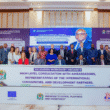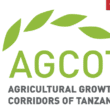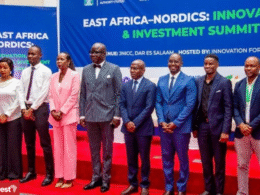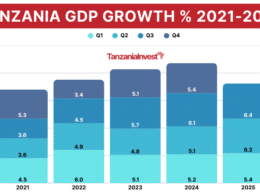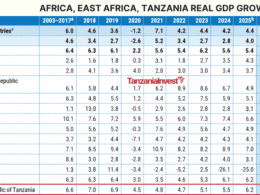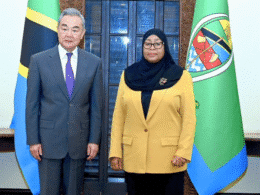TanzaniaInvest.com interviewed former Tanzania Investment Center (TIC) Executive Director Raymond Mbilinyi as he shared TIC involvement in processing investment procedures and assisting Investors who invest in Tanzania.
TanzaniaInvest.com : First of all, I would like to talk with you about the performance of foreign direct invesment in Tanzania. The latest figure we could find refers to 2010 where the average inflow was approximately $50 million. Can you clarify statistics for 2011 and 2012?
Raymond Mbilinyi : Actually the FDI for 2010 was $650 million. 2011 based on the World Investment Report was $1.1 billion. The 2012 report will be released July 2013.
TI : What has been the most vibrant sectors of the Tanzanian Economy?
RM : Most of the FDI has gone into exploration of oil and gas in the southern part of Tanzania. Also the manufacturing sector which is doing well, there is a huge increase in investment in manufacturing. The mining sector is also doing well and is receiving increased investments for expansion and exploration with existing mining. Tourism is also one of the sectors that is attracting more investment.
TI : Your country enjoys access to the East African Community and the Southern African Development markets. However, there have been challenges for reliable power supply. What is the situation now for investors wanting to setup industrial and manufacturing facilities in Tanzania?
RM : Yes, the power supply has been a challenge. The good thing is the government has plan for the power supply in terms of what needs to be done in order to make sure we improve the power supply for Tanzania. What we need to do at the moment is meet the target which is 3000 mega watts. The currrent situation now has improved. We are building a pipeline to bring natural gas to Dar es Salaam that will be utilized for industry and power supply for Dar es Salaam.
TI : Tanzania has an ambitious goal of 1.5 million tourists by 2015. At the same time we see British Airways deciding to end its London-Dar es Salaam route. Keep in mind that UK is one of the main providers of tourists to Tanzania. How do think this will affect the objective of 1.5 million tourists by 2015?
RM : BA has their own strategy for that decision. The most important thing is there are other airlines that are increasing their flights to Dar es Salaam. Airlines like Emirates, Ethiopian, Qatar are all operating in Tanzania and some have direct flights. We are also looking at other airlines to increase their number of flights.
TI : Tourism has traditionally been one of the main currency earners in Tanzania. The focus now is on gas. Is this impacting the tourism industry or is the country on the same path and gas is just an add on?
RM : The government has a five year development plan. We have a strategy for this country. We identify which are the areas we need to focus on. Off course, Tourism is one of the key sectors and will continue to be a key sector. We are looking at other sectors that will also improve the infrastructure, road, rail which will impact Tourism. So we are not ignoring Tourism but we are also putting emphasis on other sectors which are beneficial to not only Tourism but to agriculture and industry.
TI : In Tanzania most of the population live in rural areas and are involved in agriculture for self sustainance. The amount of land for arable purposes is huge. Why hasn’t the sector picked up as it could?
RM : It is true almost 80% of the population are in rural areas. We as the government have done a lot of policy improvements to make sure we improve the agriculture of this country. There are some challenges which retard the growth of agriculture in Tanzania. One of them is to have the right agricutural inputs for the right price. Most important is the mechanization of agriculture and equally important is looking at the markets for agricultural produce, so that the whole sector can be commercially attractive. Not only for the rural farmers but the commercial farmers, they can be a nucleas working together. The government is working on that. Now we have a very strong policy for agriculture. We will identify land, inputs, and how we should process agri products to ensure that it becomes vibrant and onne of the biggest growth sectors in Tanzania.
TI : What are the sectors of the Tanzanian Economy? You mentioned agriculture, tourism, gas, and manufacturing. What else is available for investment in Tanzania?
RM : Power generation should attract investors, that is one of the huge sectors with opportunity. Transportation is another area which is very important. We need to improve transportation. Airlines; with the increasing nuber of tourists coming to Tanzania, the airline industry is an important sub-sector. Tanzania is well connected. It is one of the most advanced ICT country in Africa. We have connected marine cables with Asia and the rest of the world. So connectivity makes us very attractive for investment.
TI : What are the benefits of investing in Tanzania compared to any other African country?
RM : First of all, Tanzania is the most peaceful country in Africa. That is a huge incentive for anyone investing in Tanzania. We minimize political risk for investors coming to Tanzania. We also look at giving a soft landing to investors who have made the decision to invest here. We give fiscal exemptions like tax breaks and exemption of capital items just to reduce the cost of them operating here. We also have non-fiscal investors. We also consider expats and professionals in the industry are very important, so we allow the investors to bring skill that is not available in the country. So we look at a whole package to make it easy for investors to invest in Tanzania.
TI : What are the areas of challenge in the investment framework?
RM : Off course we have some challenges. As any country. There are challenges. Tanzania is a big country. We need to do more for infrastructure. The government has done wonerful in terms of infrastructure. Still there is room for improvement. We have not reached every corner of the country. Power is a challenge. We have a huge resource of energy, we have strong energy potential. We need now to convert it to power. We also need to continously improve the investment policy. 6:50/2 So that every sector within the government is more effective and more efficient.
TI : Can you be more specific about sectors that need to be improved?
RM : For example it takes two weeks to finalise a work permit for Tanzania. We want to make it in 2-3days that you get your Work Permit. So there is always room for improvement.
TI : Tanzania Investment Centre as you mentioned is a one-stop shop for Investors. Through your agency one can get an investment certificate, which is not compulsory. What are the advantages of having a Tanzania Investment Centre Certificate?
RM : The advantage of having a TIC Certificate is the incentive attached to the certificate. You become recognized as an Investor. We are the Custodian of the Investment Code of Tanzania. We have the facilitator and the promoter of the investor. Then you have the incentives attached, which are fiscal and non-fiscal incentives that can only be accessed if you have a TIC Certificate. Most importantly, it sees through facilitation issues. We facilitate all the investors, whether you are registered or not registered with TIC. It makes it easy for after care services to register, we can know where you are, how you are doing so that we can facilitate you better.
TI : Can the entire investment process be done through your agency?
RM : Yes, most of the process can be done with us. TIC has business licensing services, we have experts from the Tanzania Revenue Authority so they process your tax issues here at TIC, we have immigration officials on premises that approve your paperwork and permits directly from TIC. We also have officials for facilitating lend issues.
TI : What is the procedure for anyone who wants to get hold of TIC and get started?
RM : TIC is your reception. You can TIC and TIC will guide you through the process. If you want to register with TIC there is a list of documents you need to submit. These are the documents which help you with incorporation, business licensing and also getting access to location of your project. So the TIC Official will take you through all these tapes. Once you have the certificate incentive then you are recognized as an Investor in Tanzania.
TI : How would you describe what is going on in Tanzania and what would be your welcoming message?
RM : I would tell the Investor that Tanzania is ready for Investment. It is the most peaceful country in Africa. So they should come here and grow with us.



